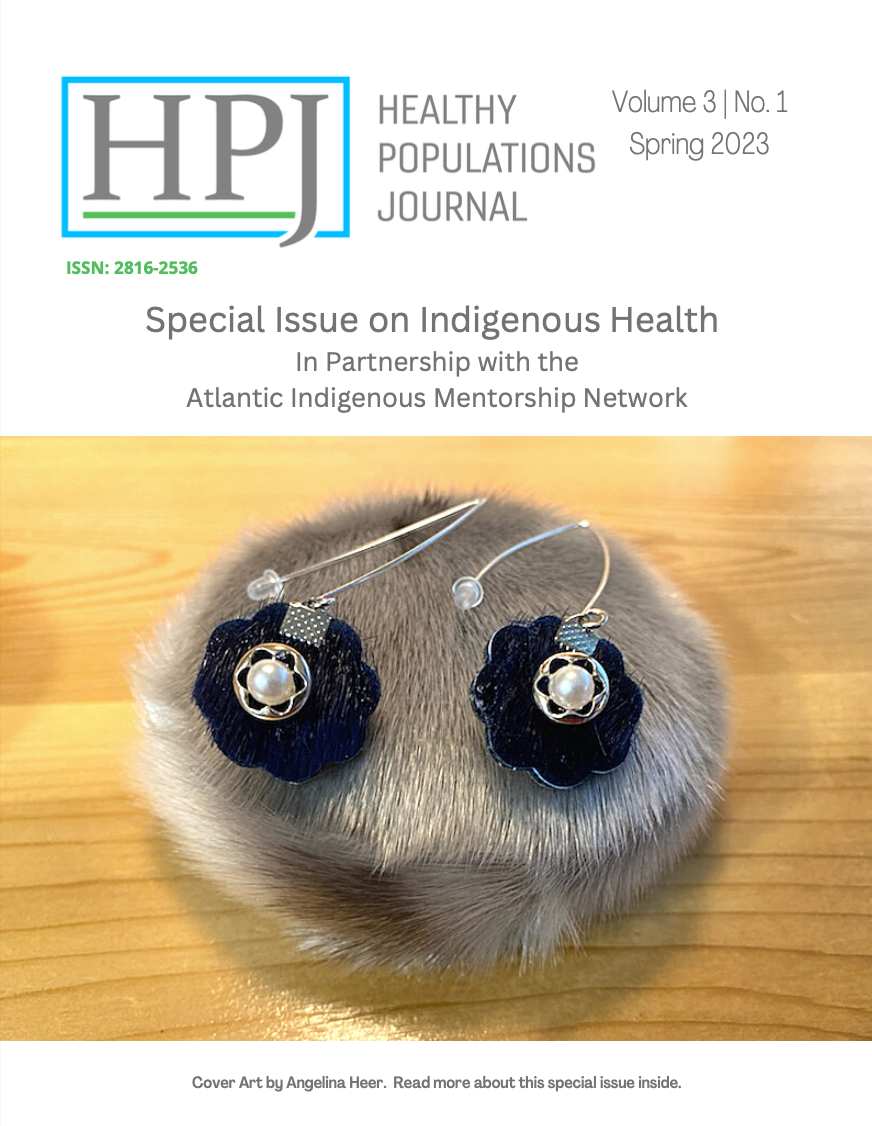Reconciliation Through Co-Learning: A Dietetic Intern‘s Journey With the Two-Eyed Seeing Program
DOI:
https://doi.org/10.15273/hpj.v3i1.11488Schlagworte:
Dietetic Internship, Two-Eyed Seeing, Knowledge SharingAbstract
The Two-Eyed Seeing Program is a Mount Saint Vincent University-based program that partners with Indigenous and non-Indigenous communities and programs to promote, decolonize, and indigenize science, technology, engineering, and mathematics (STEM) through summer camps for Indigenous youth. In the summer of 2022, Megan Churchill, a settler, was the dietetic intern with the Two-Eyed Seeing Program. The commentary shares her experiences throughout the dietetic internship placement, including meeting with Elder Dr. Albert Marshall. Throughout Megan‘s dietetic internship placement, she noticed that Indigenous Knowledge and values are rarely incorporated into university STEM education; therefore, this commentary advocates for Indigenous studies and knowledge to be made mandatory in university settings.
Literaturhinweise
Bartlett, C., Marshall, M., & Marshall, A. (2012). Two-Eyed Seeing and other lessons learned within a co-learning journey of bringing together Indigenous and mainstream knowledges and ways of knowing. Journal of Environmental Studies and Sciences, 2(4), 331–340. https://doi.org/10.1007/s13412-012-0086-8
Breakfast and Beyond Program. (n.d.). Breakfast and Beyond Program—About. Retrieved August 29, 2022, from https://www.msvu.ca/academics/professional-studies-at-the-mount/bsc-applied-human-nutrition/faculty-profiles/shannan-grant-pdt-msc-phd/breakfast-and-beyond-program/breakfast-and-beyond-program-about/
Canada Millennium Scholarship Foundation. (2005, September). Changing course: Improving Aboriginal access to post-secondary education in Canada (Millennium Research Note #2). https://library.carleton.ca/sites/default/files/find/data/surveys/pdf_files/millennium_2005-09_rn-2_en.pdf
Cullen-Unsworth, L. C., Butler, J. R. A., Hill, R., & Wallace, M. (2010). Cooperative research: An example from the Wet Tropics of Queensland. International Journal of Interdisciplinary Social Sciences, 5(6), 139–154.
Doria-Brown, J. (2022, August 10). UPEI makes Indigenous Studies course mandatory in order to graduate. CBC News. https://www.cbc.ca/news/canada/prince-edward-island/pei-indigenous-faculty-upei-1.6547157
Durie, M. (2004). Understanding health and illness: Research at the interface between science and Indigenous Knowledge. International Journal of Epidemiology, 33(5), 1138–1143. https://doi.org/10.1093/ije/dyh250
Latimer, M., Sylliboy, J. R., MacLeod, E., Rudderham, S., Francis, J., Hutt-MacLeod, D., Harman, K., & Finley, G. A. (2018). Creating a safe space for First Nations youth to share their pain. PAIN Reports, 3(Suppl 1), Article E682. http://dx.doi.org/10.1097/PR9.0000000000000682
Maritime Museum of the Atlantic. (n.d.). About. Retrieved August 29, 2022, from https://maritimemuseum.novascotia.ca/about
Mount Saint Vincent University. (n.d.). Etuaptmumk (Two-Eyed Seeing) as a guiding principle for camp development, implementation, and evaluation. Retrieved August 29, 2022, from https://www.msvu.ca/academics/professional-studies-at-the-mount/bsc-applied-human-nutrition/faculty-profiles/shannan-grant-pdt-msc-phd/nserc-promo-science-two-eyed-seeing-project/
Partnership for Dietetic Education and Practice. (n.d.). What we do. Retrieved August 2022, from https://www.pdep.ca/about-pdep/what-we-do.aspx
Partnership for Dietetic Education and Practice. (2020, August 4). Integrated competencies for dietetic education and practice (ICDEP). https://www.pdep.ca/library/PDEP-Policies/Integrated-Competencies-For-Dietetic-Education-And.aspx
Roher, S. I. G., Yu, Z., Martin, D. H., & Benoit, A. C. (2021). How is Equaptmumk/Two-Eyed Seeing characterized in Indigenous health research? A scoping review. PLOS ONE, 16(7), Article e0254612. https://doi.org/10.1371/journal.pone.0254612
Statistics Canada. (2018, March 21). Distribution of the population aged 25 to 64 (total and with Aboriginal identity), by highest certificate, diploma or degree and age group. https://doi.org/10.25318/3710009901-eng
Truth and Reconciliation Commission of Canada. (2015). Truth and Reconciliation Commission of Canada: Calls to action. https://www2.gov.bc.ca/assets/gov/british-columbians-our-governments/indigenous-people/aboriginal-peoples-documents/calls_to_action_english2.pdf
United Nations General Assembly. (2007). United Nations declaration on the rights of Indigenous Peoples. https://www.un.org/development/desa/indigenouspeoples/wp-content/uploads/sites/19/2018/11/UNDRIP_E_web.pdf
Downloads
Veröffentlicht
Ausgabe
Rubrik
Lizenz
Copyright (c) 2023 Megan Churchill, Shannan Grant, Florence Blackett, Ann Sylliboy, Albert Marshall

Dieses Werk steht unter der Lizenz Creative Commons Namensnennung - Nicht-kommerziell 4.0 International. The journal aims to reduce barriers to publishing and sharing research and inequalities to accessing information.This journal provides immediate open access to its content on the principle that making research freely available to the public supports a greater global exchange of knowledge. The open-access nature of the journal means that there will be no charge for authors or readers to use the journal. The journal has a Creative Commons Attribution Non-Commercial (CCBYNC) attribution which allows the author (and others) to share and distribute their full-text article in other public domains, such as Google Scholar or Research Gate.


